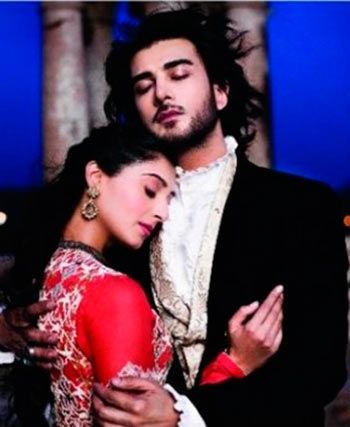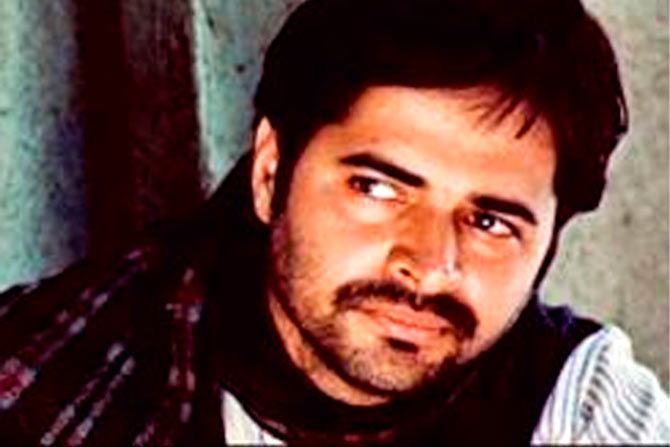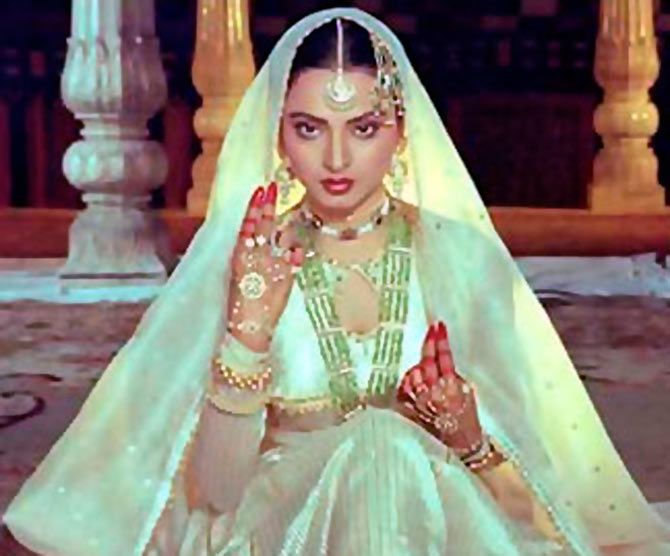 'Rekha's eyes tell a very intense story. You look at her and you feel that this woman has the resilience to face the world. You can feel the whole journey of Umrao Jaan through her eyes in the song, In Ankhon ki Masti.'
'Rekha's eyes tell a very intense story. You look at her and you feel that this woman has the resilience to face the world. You can feel the whole journey of Umrao Jaan through her eyes in the song, In Ankhon ki Masti.'
'Dimple Kapadia was very easy to work with in those days but today, she's in another zone. If Zooni had been completed, Dimple would have been a legend today!'
Filmmaker Muzaffar Ali looks back at his movies.
Muzaffar Ali gave Rekha Umrao Jaan, and made her a legend.
This Friday, the 70-year-old filmmaker makes a comeback to the movies after 20 years, with his film Jaanisaar. Starring Imran Abbas and Perniz Qureshi, the film is set in 1877.
Ali, who hails from a royal family, discusses his movies, his regal life, and his filmmaker son Shaadi Ali. Patcy N/Rediff.com listens in.
Left: Pernia Qureshi and Imran Abbas in Jaanisaar
Your last work -- a documentary called Khizan -- was released in 1995. Why did it take you so long to make a film?
My feature film Zooni got abandoned in 1990. I waited a long time for it to restart; we tried to find ways but the situation became worse when my father passed away. I had to shift to Lucknow.
I made several documentaries on Sufism. I made a television serial too. Then my wife Meera and I started a handicraft boutique in our hometown Kotwara (in Lucknow), called the House of Kotwara. That took me on a completely different journey.
At the same time, I have been working on several scripts.
In the West, it's easier to come up with unusual ideas. But in India, you have to conform to a certain kind of cinema. Commercial cinema has become quite substandard; it's not deeply inspiring.
My new film Jaanisaar has caught the fancy of some people, may be because of the Umrao Jaan connect, that same period and genre, and has seen the light of day.
Why are you so fascinated with period drama?
There is a romance around it. You get to recreate that period and the illusion of the past. You also unravel certain areas of history, which you can share with people. History has been pushed under the carpet, especially the events of 1857.
All the sacrifices that were made are lost.
History is always written by the conqueror, they negate your history. It is important for people to understand their own history.
How you decide on your cast, Imran Abbas and Pernia Qureshi?
Pernia is very passionate about dance and acting -- her role in the film is that of a dancer. So for me, she was the right person to cast.
If I had taken somebody from the industry, I would have to teach them dance. Dance needs to come from inside; it cannot be imposed on you.
Imran is a charming guy. He's a known actor in Pakistan. In India, when actors get stardom, it's difficult to even talk to them. They want big banners.

You play a revolutionary in the film…
I am not an actor but this was an important role and very few people can play this role -- like Amitabh Bachchan and Naseeruddin Shah.
Amitabh did not have time for two years, and I couldn't wait. Naseer was also not available, and I did not push hard.
So my son (Shaad Ali, director of films like Saathiya, Bunty Aur Babli and Kill Dil) asked me to do the role. He helped me out with my acting scenes.
What do you think of Shaad as a director?
He is a very intelligent person. He has got a sharp sense of film and camera, screenplay and dialogue. He's got a very commercial mind.
But he doesn't make period cinema like you do.
I may have influenced him in some way or the other. But it is better to have your own style.
How did you get attracted to films?
After graduation, I worked in an advertising company called Clarion McCann in Kolkata for three years.
I worked with Mr Satyajit Ray there. I would spend a lot of time with him. I would go to his house and get enamored by his passion of making films. He would detail everything -- make sketches and plan the music. I knew how to sketch, so I started sketching my films.
After that, I came to Mumbai and joined Air India. I took care of Air India's advertising for 11 years. I started work on my first film Gaman during this time.

How did you select a subject for Gaman (1978)?
I realised that if people like Ray can make film on their culture, (so can I). The UP culture is equally rich, and its creative people got into Bollywood to make diluted cinema. I thought Awadh needed to presented in a very sensitive way.
The other thing was when I came to Mumbai, I realised that when people migrate from small towns to bigger ones, they lose a lot -- they lose their identity, their language, their habitat, their emotional bonding. They live a strange existence, and it affects the local people also.
That's how Gaman was born.
You made your first film at age 33. Since you come from a royal family, did you face opposition from your parents?
My father was a very progressive person. He did not have any restrictions.
In fact, when I made my first film, he sent me a telegram saying: 'Effort is thy duty, reward is not thy concern'.
I had mortgaged my house in Lucknow to make the film.
My father was happy that I made films on social issues, as he felt films is an important medium.
You worked with Smita Patil, Naseeruddin Shah and Farooque Shaikh in Gaman. What was it like working with them in your very first film?
Working with Smita and Farooque was a joy.
Farooque is a very easy person to work with. He could bring a lot of substance, beauty and sensitivity to a role.
I have introduced Nana Patekar in that film. He was from Marathi theatre, and would handle aspects like publicity. He used to do all kinds of odd jobs on the sets.
There were lots of Marathi actors in Gaman. Their dubbing would be done by Naseer, Khulbushan Kharbhanda and Om Puri.
How did you manage the finance?
In those days, a film would cost only three and a half lakh.
I mortgaged my home, and took a loan from FFC (Film Finance Corporation) and NFDC (National Film Development Corporation of India).
After Gaman, you made a documentary called Vasiqedar, the Pensioners of Awadh. How did you get interested in that?
I am not restricted to any form of thinking. I paint, and have had about five exhibitions.
I indulge in music too.
So making a documentary was just another step.
Making a documentary was important because it dealt with people, who were the vasiqedars of Awadh. Those people are descendants of royal families and their money was taken away by the British as loans.
But the people are getting barely two and five rupees as returns, even though the money taken away was much more.
How did you choose your topics for documentaries?
I choose topics that are close to my heart. I have done a lot of documentaries on Sufism and handicraft.

You have done so many movies and documentaries but you remain best known for your film, Umrao Jaan. Does that upset you?
No. If I get upset by these things, I would have had it. One has to just live with it.
How tough was it for you to get Rekha on board in Umrao Jaan?
When I was making Umrao Jaan, my financier was very commercial and he wanted to take a known name. I was guided by what my financier said.
But why did you decide on Rekha?
There was something in her -- maybe her aura or her persona that lends itself to this role.
Her eyes tell a very intense story. You look at her and you feel that this woman has the resilience to face the world. You can feel the whole journey of Umrao Jaan through her eyes in the song, In Ankhon ki Masti.
Rekha thought the film would be a breakthrough for her career. She was a star but she wanted to be remembered as an actor too.
Are you in touch with her today?
I hardly meet Rekha. No, I don't call her or keep in touch.
Umrao Jaan is a cult film today but it did not fare well at the box office then.
I don't think a film should be measured entirely by money. It should be measured by the space it takes into your hearts and how long it remains there.
There are many films that I watch in theatres, and am very excited about. But I don't remember them after that.
What kind of difficulty do you face while making the film?
Finance is always the biggest difficulty. Finance is not easy to come by, especially for people like us.
Farooque was very punctual and disciplined, but during Zooni, Vinod Khanna did not abide by the schedules. Dimple Kapadia was very easy to work with in those days but today, she's in another zone. If Zooni had been completed, Dimple would have been a legend today!
What went wrong with Zooni?
I think I was too ambitious. I took on more than I could chew. The film was in two languages, English and Hindi. That's why the shooting took so long -- I shot the film for a year.
I started in January 1989 and abandoned it by the end of the year. The situation in Kashmir had become worse, so we had to leave.
It was not possible to shoot the film in another location because that wouldn't do justice to the project. I did try to shoot in Himachal Pradesh but the vegetation and architecture were not similar.
After that, you started work on two films, Agaman and Anjuman.
Agaman is based in Uttar Pradesh's sugarcane co-operative movement in rural India. It was government-sponsored film and released in Lucknow.
Anjuman was a very important film for me but it never released.
What have you been doing since 1991?
I made some documentaries; I did a television show called Husn-E-Jaana. It had 27 episodes, and was shot in Kotwara.
What kind of movies do you like to watch?
I like all kinds of films but mostly, I like period films.
I watch international films too. Recently, I watched Guy Ritchie's Sherlock Holmes movies, and a Marathi film called Qilla.
What keeps you going at 70? What is your daily routine like?
I get up, exercise, walk, do yoga and then get to my work. I'm in Mumbai at the moment, staying with my son. So I don't have much to do here.
But in Delhi, I have more space. I read books, meet people.
I keep animals at home, like horses and dogs.











 © 2025
© 2025